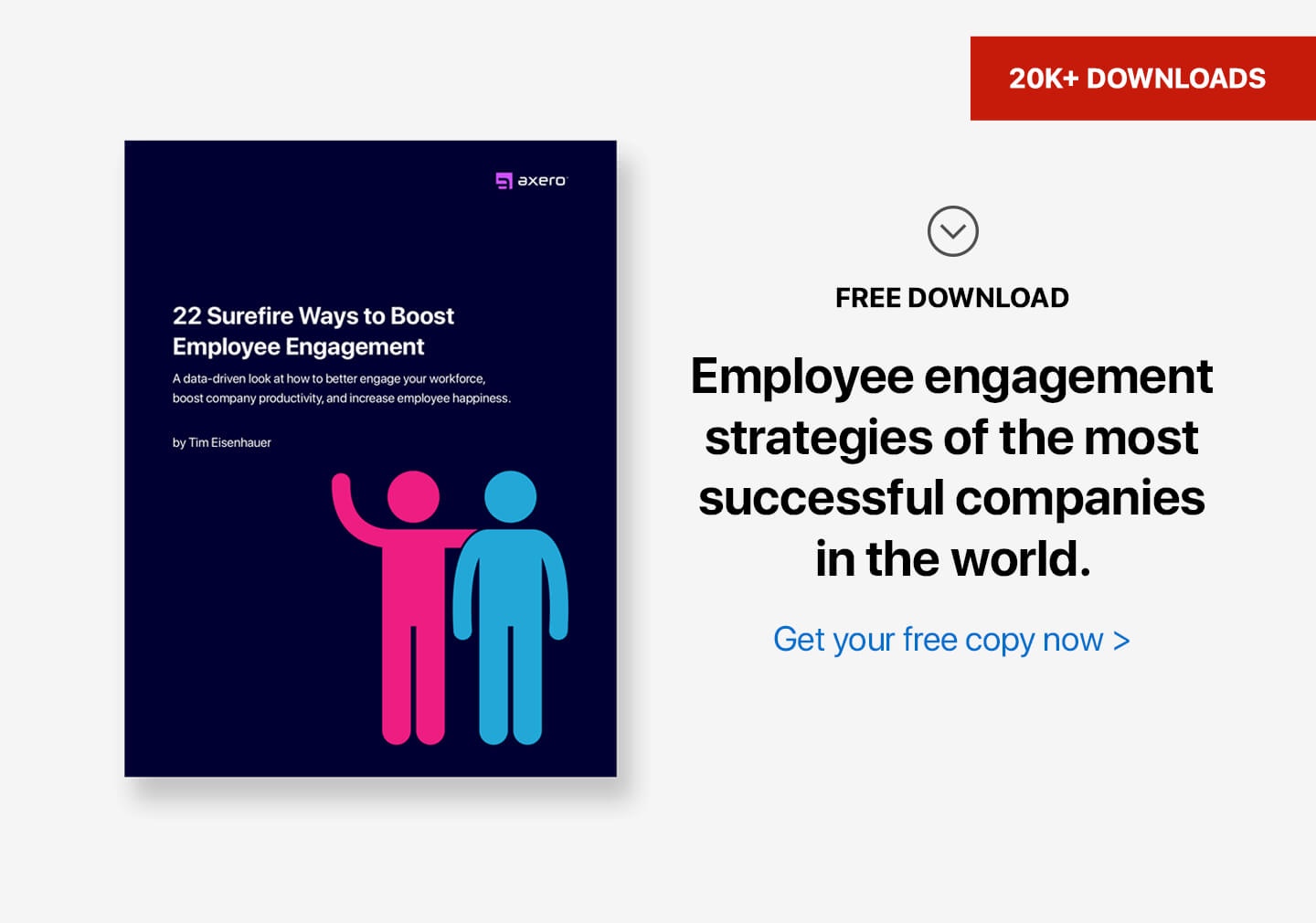Hiring motivated employees.
— Food Service Director
Low wages + demanding job = high turnover. It’s easy to see how keeping a busy kitchen staffed and motivated could be a task.
Unfortunately, more and more workplaces look like busy, understaffed kitchens these days. I mean you have to be motivated to work there! So, what’s a manager to do?
Until just a few years ago, I was feeling this Food Service Director’s pain every day. Axero had been fortunate enough to have talented and motivated people take care of all our vital business functions, except one: sales.
That’s a big one, right? So I was pretty motivated to find someone to take the worry of meeting our sales goals off my shoulders. We were a healthy company and a great team. We had a competitive product with a strong track record in a growing market. I figured that was all an experienced person needed to make himself and the rest of us fabulously wealthy.
I went out there to interview candidates feeling good about what I had to offer. I met a truckload of suits and resumes. One thing was missing from the scene, however: the motivation to sell my software.
For one, why were they all asking for a big salary, when they could name their commission? Didn’t they promise to triple my sales in a year? I was willing to pay for anything necessary to make that happen—travel, expenses, health, 401(K)… I would even throw in a dry-cleaning allowance for the suits and the ties.
No deal.
Finally, I settled on “Ethan.” Ethan’s salary requirements were modest compared to the rest. And besides, he was such a charming, thoughtful, sincere, and likable guy, that I decided that he was worth the risk.
Soon after his hiring, I started questioning Ethan’s motivation too. The guy spent far more time convincing us to change our software than persuading the buyers to buy it. It was always, “Add this feature, tweak that layout—and I will get you a sale.” And we believed him. The first five times. Until at last it became clear that Ethan wasn’t our guy.
With Ethan gone, I did the only thing left for me to do. I hired myself. Why pay someone who is not even as good as me? If nothing else, I felt motivated to take the job and do it right.
Hiring myself to do sales proved to be a stroke of genius. I recommend it to all managers who are struggling to find motivated employees. Do the job yourself, at least for a day. You might discover something.
The first thing I discovered was that we had too many leads coming in, most of them junk. Ethan wasted his time chasing after the wrong buyers. The supposed flaws of our software must have been excuses they gave him to get off his follow-up list. When I took over sales, I put in a process to qualify the leads, and none of Ethan’s complaints ever came up.
Why didn’t an experienced sales guy think of something as basic as qualifying the leads? Upon a closer look, Ethan had the wrong experience. His previous employer was the only solution provider in its space. There were few window shoppers, and Ethan’s approach worked.
Fine, there’s something to learn on every job. How could I have known Ethan would never adjust to selling in a competitive market?
This question goes back to something I wrote in Who the Hell Wants to Work for You? Chapter 2, Hire Traits and Behaviors. People can always learn on the job, provided they want to learn. It turned out that Ethan was a know-it-all. More importantly, I think, he lacked the self-confidence to “go for the no,” and zero in on the likely buyer.
Even with qualified buyers, Ethan often could not close the sale. Sales trainers use the term FUD—fear, uncertainty, doubt—to explain buyer behavior. Rather than taking it personally, a good salesman helps the buyer overcome these common barriers to making a decision. Although hard-working and ambitious, Ethan failed at his job. He didn’t have what the buyers needed from him. Underneath his charming facade, Ethan was all fear, uncertainty, doubt.
As managers, we rely on motivated employees to get the work done. Fortunately, motivation is a function of many variables, some of which we control. When it seems there aren’t any good people willing to do the job, try these:
- Change the job. As I learned from being my own sales guy, I was asking sales to do something I could automate. Namely, qualifying the leads. Now that the sales process is well defined, others can step in and be productive. And they have.
- Change your hiring practices. Lack of motivation could be a lack of fit. Looking back, I wouldn’t have hired Ethan, even after I’ve bulletproofed my sales tactics. Any future Axero salesperson will need to show proficiency with FUD. Smell it coming. Communicate value to the buyer. Move on from your setbacks.
- Change your management style. Here, many people would talk about micromanagement. How it’s so bad to suffocate people around you. I learned I wasn’t micromanaging enough. I left Ethan to create his own sales process, and it failed. He wasn’t creating anything. He was doing what he had done in the past, and it didn’t work for our buyers. I suspect that in many cases where employees fail, putting the right structure in place would help them succeed.
In the end, motivation was not a factor in my case. It was the three items above that made the difference. I believe all new hires come in motivated to succeed. Think back to your first day on any job. Were you not looking forward to it even a little?
What happened next? When did that hope fizzle out? Since I’ve started asking readers about their Biggest Challenge at Work, many new hires have written to say that they’re struggling to keep themselves motivated. As a manager, what can you do to help them? Let’s give it some thought in the next post.
_____
If you hire people, you might like my book, because it’s better to get it right the first time.












 info@axerosolutions.com
info@axerosolutions.com 1-855-AXERO-55
1-855-AXERO-55


